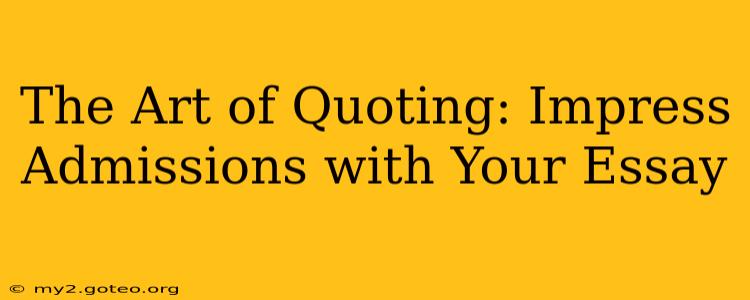The Art of Quoting: Impress Admissions with Your Essay
The college application essay is your chance to shine, to showcase your personality, experiences, and aspirations. While your narrative is crucial, the way you tell your story can significantly impact your application's success. Mastering the art of quoting—using impactful quotes effectively—can elevate your essay from good to unforgettable. This isn't about randomly sprinkling quotes; it's about strategically weaving them into your narrative to add depth, context, and memorability. Let's explore how to quote like a pro and impress admissions officers.
Why Use Quotes in Your College Essay?
Using quotes judiciously can significantly enhance your essay's impact. They can:
- Add depth and complexity: A well-chosen quote can illuminate a complex emotion, idea, or experience that you might struggle to articulate in your own words.
- Provide context and support: Quotes from reputable sources can lend credibility and authority to your claims and arguments.
- Showcase your intellectual curiosity: Demonstrating familiarity with insightful thinkers and texts reveals your intellectual engagement and broad interests.
- Enhance your voice and style: The right quote can add a unique flair and personality to your writing, making it more engaging and memorable.
- Strengthen your argument: Quotes can provide powerful evidence or support for your central theme.
How to Choose the Right Quote
Selecting the perfect quote isn't about finding the most famous or impressive one; it's about finding the most relevant and impactful quote for your specific story. Consider these points:
- Relevance: The quote must directly relate to your essay's theme and central argument.
- Impact: Does the quote resonate with you personally? Does it add a new layer of meaning to your experience?
- Originality: While common quotes can work, try to choose something less predictable to showcase your unique perspective. Exploring lesser-known sources can be particularly effective.
- Attribution: Always accurately attribute the quote to its source, including the author's name and the work from which it is taken.
How to Integrate Quotes Effectively
Simply dropping a quote into your essay won't suffice. Effective integration requires careful consideration:
- Contextualization: Before introducing a quote, provide sufficient context so the reader understands its relevance to your narrative. Explain why you chose this particular quote and what it means to you.
- Smooth Transition: Don't just abruptly insert the quote. Use transition phrases to seamlessly integrate it into your writing (e.g., "As Maya Angelou wisely observed," or "This experience echoes the sentiment expressed by...")
- Analysis: After presenting the quote, analyze its significance. Explain how it relates to your personal experience, supports your argument, or enhances your overall point.
- Avoid Overquoting: Keep the focus on your own voice and experiences. Use quotes sparingly and strategically, letting them serve as supportive elements rather than dominating your essay.
What if I Can't Find the "Perfect" Quote?
Don't stress about finding the single perfect quote. Sometimes, a well-written observation in your own voice is more impactful than a forced quote. Prioritize clarity, authenticity, and strong storytelling above all else.
What are some good sources for finding quotes?
Many resources are available for finding fitting quotes. Consider exploring literary works, philosophical texts, speeches, songs, or even quotes from influential figures in your field of interest. Online quote databases and libraries can also be helpful resources. However, remember to always verify the accuracy and source of any quote you intend to use.
Should I use quotes from popular culture?
Using quotes from popular culture can be effective, particularly if relevant to your narrative and personal experience. However, exercise caution; ensure the source is appropriate for an academic setting and that the quote effectively contributes to your essay's overall purpose. Avoid overly casual or cliché quotes.
How many quotes should I use in my college essay?
There's no magic number. Aim for quality over quantity. A few well-chosen and effectively integrated quotes are far more impactful than numerous irrelevant or poorly incorporated ones. Prioritize the quality of your writing and the strength of your personal narrative.
In conclusion, the strategic use of quotes can significantly enhance your college essay, adding depth, complexity, and memorability. However, remember that the essay should primarily reflect your unique voice and experiences. Use quotes to complement, not overshadow, your own narrative. With careful selection, integration, and analysis, you can master the art of quoting and create an essay that truly captivates admissions officers.

